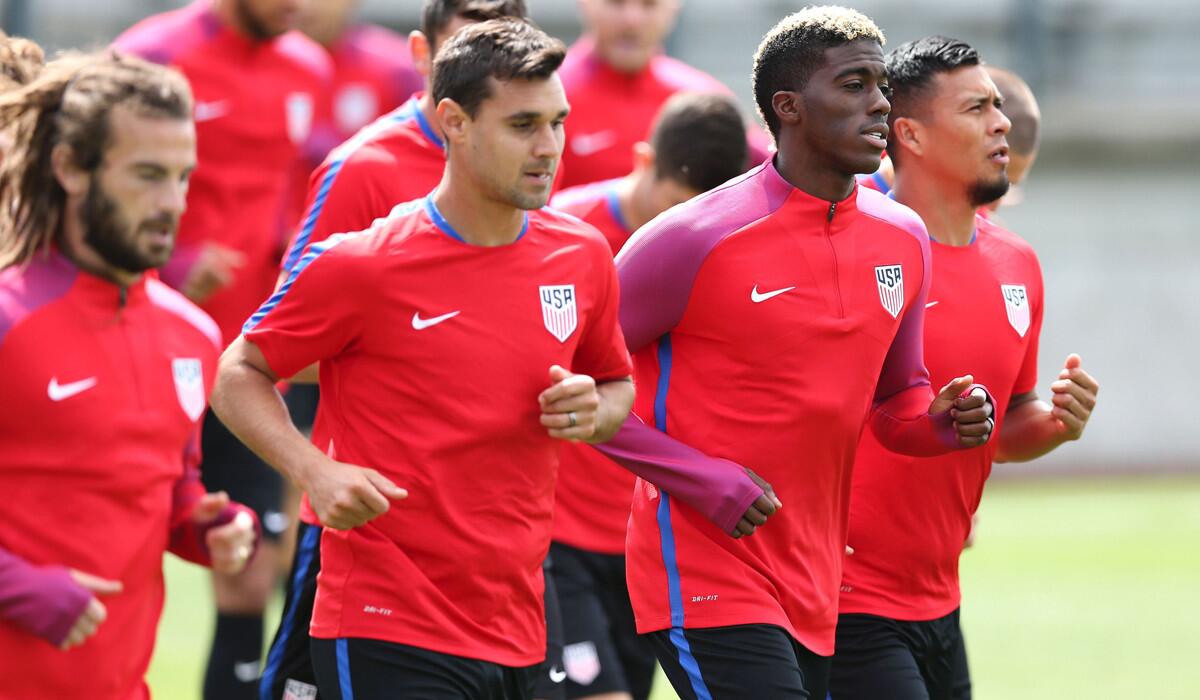Pressure nothing new for U.S. in Copa America

Reporting from SEATTLE — The U.S. has had very little margin for error in the Copa America Centenario. Because after losing their first game to Colombia, the Americans had to win their next two to assure themselves a spot in the one-and-done knockout rounds.
They did just that, finishing atop their four-team group in the process. And defender Geoff Cameron says that experience has prepared the team for the pressures that lay ahead, beginning with Thursday’s quarterfinal with Ecuador at CenturyLink Field.
“It really hasn’t changed for us,” he said before training Tuesday morning in rainy Seattle. “It’s been a knockout [round] since the second game. So our mentality’s the same.
“We’re in the quarterfinals now and we have a chance to make a run. We believe in each other. We feel like something special is happening here.”
A win Thursday would certainly qualify as something special because with the exception of the CONCACAF Gold Cup, the U.S. has won a quarterfinal game in a major international competition just once, in the 1995 Copa America.
“It’s the same situation,” said Clint Dempsey, who has scored or assisted on four of the five U.S. goals in the Centenario. “Do or die. You lose, you go home.
“And we’re looking to go far in this tournament.”
That will get increasingly harder for the U.S. because if it gets past 13th-ranked Ecuador, a team it beat in a friendly just three weeks ago, the likely semifinal opponents will be Lionel Messi and No. 1 Argentina. Messi and Co. beat Bolivia on Tuesday, becoming the only team to exit group play with a perfect record. As a result, they will be heavily favored to beat Venezuela in the quarterfinals.
Ironically the U.S. may have had an easier route to the Copa final if it hadn’t won its group. Finishing first lifted it into the top half of the bracket, costing the Americans a training day, forcing them to fly from Philadelphia to Seattle and earning them a matchup with a top-15 team in the quarterfinals. Win that and the reward is Argentina.
If the U.S. had finished second, it would have stayed on the East Coast to play Peru (FIFA rank: 48) with Mexico looming as the likely semifinal foe. But then few things have gone to form in this tournament, the first Copa America to be played on U.S. soil.
The group stage saw a World Cup semifinalist, a World Cup quarterfinalist and the world’s ninth-ranked team eliminated, with Brazil, Costa Rica and Uruguay all being sent home. Brazil, which lost its final game to Peru on a disputed goal, also sent its coach home, firing Dunga after failing to advance out of group play for the first time since 1987.
Meanwhile lightly regarded Venezuela shut out both Uruguay, which played all three of its games without injured striker Luis Suarez, and Jamaica and was 10 minutes away from blanking Mexico before settling for a draw. That sends Venezuela, the only winless team in CONMEBOL World Cup qualifying, on to the Copa quarterfinals unbeaten.
“You’ve seen teams beat other teams that you’re shocked at,” Cameron said. “Every team has good players.”
But aside from Argentina none of those teams are hotter than the U.S., which goes into the next round riding consecutive shutouts. After giving up goals on a corner kick and a penalty kick in the first half of the tournament opener, goalkeeper Brad Guzan has been perfect, putting together a streak of 228 consecutive scoreless minutes.
And with Copa rules changing for the next two rounds, sending ties directly to penalty kicks after 90 minutes, a hot keeper becomes even more important.
Dempsey said the new rules will change the way teams approach the game, with some playing conservatively in the hopes of going to penalties while others will push harder for goals to avoid that.
U.S. Coach Juergen Klinsmann says that won’t determine his team’s fate, though.
“A tournament is decided by the chemistry of a group, not necessarily by the best team,” said Klinsmann, a World Cup winner with Germany. “It’s how a group kind of grows together, how they support each other. How they sense problems, how they solve problems.
“It’s the group that makes the difference. And that is what’s happen[ing] right now.”




